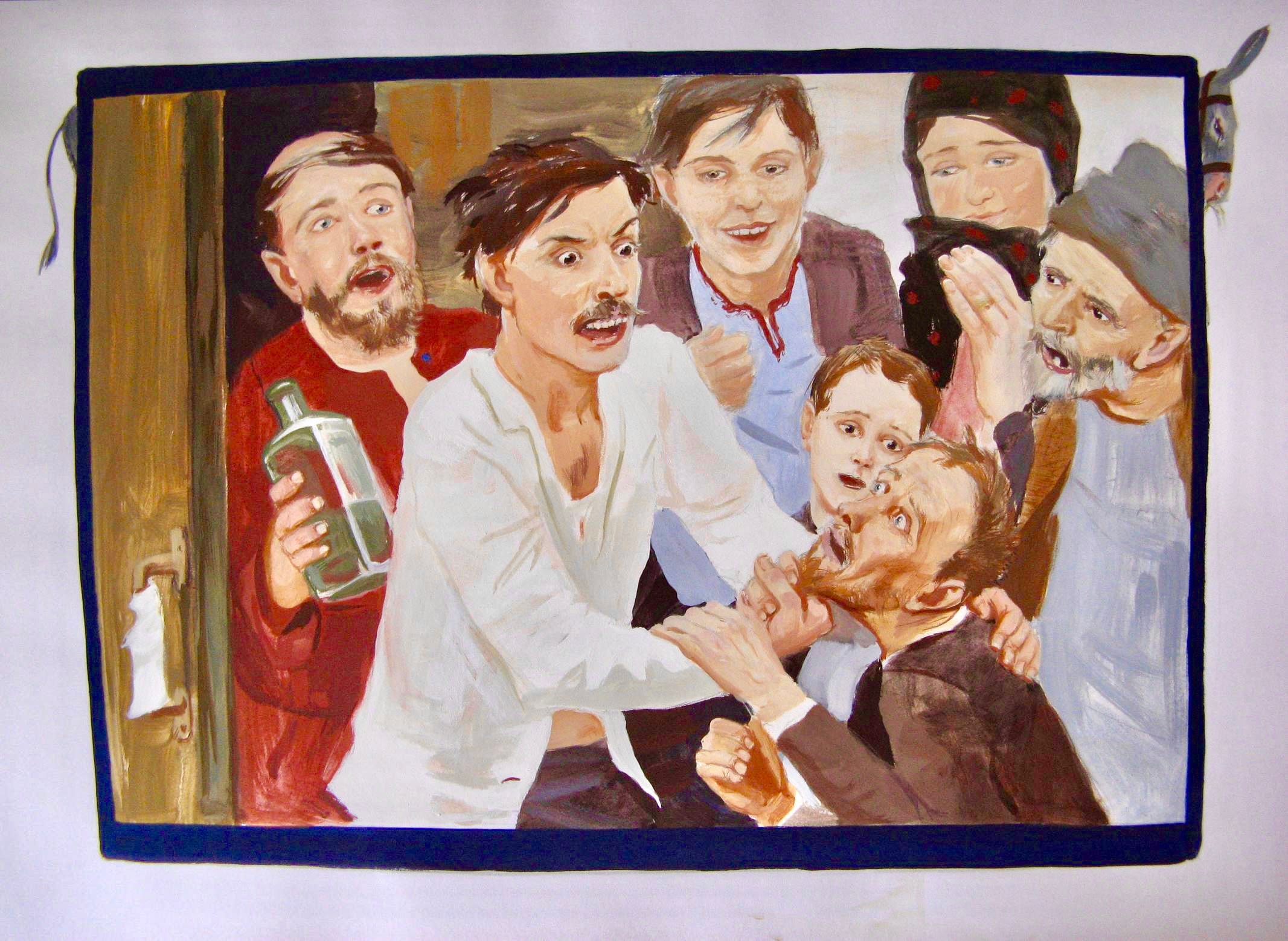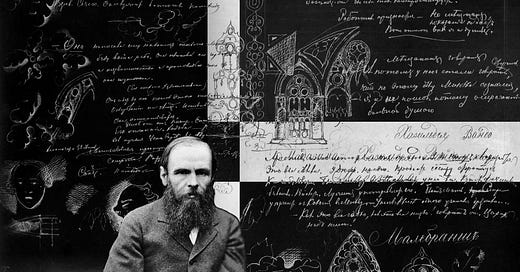Worth Every Ruble: Katz’s ‘Brothers Karamazov’
Guest Reviewer John Stamps Explains What Sets The New Translation Apart
It took almost a century and half, but Michael R. Katz has finally given us the translation of The Brothers Karamazov Dostoevsky and his English readers deserve. Katz transforms the novel into a legal thriller worthy of John Grisham. You think I jest? I do not. It crackles and zings. Every paragraph is impassioned, fiery, and intense. Characters jump from the page. I couldn’t wait for the next weird thing that was going to happen to these fascinating all-too-human characters.
How did Katz accomplish such a miracle? For starters, he cheated. To explain how, let me offer some background.

Russian Dressed as Actual English
This is the fifth time I’ve read The Brothers Karamazov. I read the Constance Garnett translation as an undergraduate back in the mid-1970s. Anybody who was anybody told me to read Dostoevsky, so I did. It was good, indeed very good. But the antiquated 1912 rendition didn’t shake me to the existential core of my being as I had been promised.
Fast forward to 1990. Richard Pevear and Larissa Volokhonsky’s stodgy translation hit the bookshelves of my local Borders store. I snatched it up immediately. Its intelligence impressed me. But it was hard to read, and it certainly didn’t knock my socks off. I was underwhelmed and didn’t know why.
I had not planned on reading any Dostoevsky in 2023. My current book queue is filled to overflowing. But then the Katz translation was released in July, and I heard excellent reports. I decided to find out if the rumors were true.

When I cracked it open, the first thing that surprised me was Katz didn’t include a list of all the various confusing Russian names, nicknames, diminutives, and patronymics. It turns out that was by design. “I eliminated what I considered unnecessary repetition of words,” he explained, “including Russian names (first names, patronymics, and diminutive forms), and rely on pronouns, synonyms, and other devices to vary the word choice.”
No wonder Katz’s translation was so easy to read! The most difficult problem in reading TBK is simply keeping track of Who Is Who and Who Said What. Like most English-speaking readers, I got lost in the sheer proliferation of nicknames and patronyms followed in other translations. I couldn’t keep the characters straight in my head.
Pevear and Volokhonsky did compile a helpful list at the front of the book with the names of the characters. I didn’t have to create my own, or worse: cheat and turn to CliffsNotes for help. But flipping back and forth to the front certainly didn’t help my comprehension of the storyline either.
Some critics might complain that we’re missing nuances to the plot without the patronymics and diminutives. After all, how people feel about each other in Russian culture is largely revealed in the names they use to address each other. However, Katz doesn’t simply eliminate every nickname.
In one crucial passage, Rakitin and Grushenka playfully share intimate nicknames in a three-way conversation with Alyosha, the youngest of the three Karamazov brothers. But when Rakitin’s rudeness and presumption crosses a line, Grushenka quickly brings their intimacy to a screeching halt:
Be quiet, Rakitka, you don’t understand a thing about us! And in the future, don’t you dare address me so familiarly; I won’t allow it. Where did you get such nerve? Go sit in the corner and keep quiet, like my lackey. And now, Alyosha, I’ll tell you the whole truth so you can see what a despicable creature I am! I’m talking to you, not Rakitka.
Switching Rakitin from the formal to the familiar—similar to the French vous and tu—completely mollified me. Katz is trying to make judicious decisions about the best way to translate significant passages in the novel. One size doesn’t fit all.
Simplifying the naming of characters is a brilliant decision. The story of this glorious cast of malcontents, oddballs, eccentrics, nutcases, buffoons, and cranks (perfect raw materials for saints-in-the-making) never once loses its brisk pace.
Neither did Katz attempt an over-literal translation. “The Russian ear,” Katz explains, “is much more tolerant of repeated words and phrases than the Anglo-American ear. A literal translation of all the author’s repetitions would be too tedious.”

I agree. If I wanted to read a turgid translation, well, I still have Pevear and Volokhonsky on my shelf. I never was able to put my finger on why I didn’t enjoy reading any of their translations. I simply assumed it was a character flaw, that I was the problem. But it turns out that I’m not the only reader who doesn’t appreciate their approach.
In an article for Commentary, Gary Saul Morson of Northwestern University reveals how Pevear and Volokhonsky’s tone-deaf literalism murders the novel and alienates the reader in the process. Morson calls their translations “the Pevearsion of Russian Literature.” By contrast, Katz’s translation makes my pulse race. In his hands, the nonstop dialogue is both gripping and easy to follow.
Notes Where God Intended
Beyond these stylistic considerations, Katz offers truly helpful footnotes. His explanation of “ultramontanism” was, for instance, where I needed it most and was nearly worth the price of admission by itself.
Some of the footnotes are painful to ponder. The tortured history of Christian-Jewish relationships over the centuries grieves me deeply. As a self-described nonobservant Jew, Katz never fails to draw our attention to the novel’s ugly antisemitic remarks in his notes. Its casual bigotry startled me.
I winced at how the narrator described Fyodor Karamazov’s relationship with Russian Jews: “At first he made the acquaintance, in his own words, ‘of many Yids, little Yids, dirty little Yids, and Yidlets.’ But he ended up later being received not only by Yids, but ‘even by some reputable Jews, too.’” Indeed, the antisemitic lexicon is, as Katz says, “imaginative”—and then some.
Katz’s notes present another important contrast with Pevear and Volokhonsky. I detest the end notes in their translations. If you’re going to add explanations, put them at the bottom of the page or on the side—where God intended. Flipping back and forth doesn’t help the reader with the pace of a serious book like The Brothers Karamazov. Katz sides with the angels and puts his notes right where God wants them.
That said, one of Katz’s footnote misses the opportunity to show why TBK is such a profoundly life-changing book. What Katz fails to explain is worse than no footnote at all. Dostoevsky tells us quite a bit about the reading habits of his characters. The buffoonish father, Fyodor, turns out to be surprisingly literate; at least he manages to stay current on anti-Christian propaganda of the Enlightenment. He’s read and digested, for example, Voltaire’s wisecrack, “If God did not exist, He would have to be invented.”
Not to be outdone, the loyal serf Grigory Vasilievich manages to get his hands on a copy of St. Isaac the Syrian’s Ascetical Homilies. Grigory has consistently read the book for many years but hasn’t understood its significance. Katz doesn’t seem to understand its significance either, as evidenced by this lazy footnote:
Isaac the Syrian was a seventh-century Orthodox Christian bishop and theologian best remembered for his written words on Christian asceticism.
The explanation fails to explain much of anything. If we want to know what makes Elder Zosima and Alyosha tick, they both drink deeply from the wellspring of St. Isaac’s profoundly mystical theology, found right there in his Ascetical Homilies.

My hunch is Katz misled himself by the title and the word “ascetical.” We can do better here. St. Isaac’s most famous quote is the beating heart of Elder Zosima and Alyosha:
What is a merciful heart? It is a heart on fire for the whole of creation, for humanity, for the birds, for the animals, for demons, and for all that exists. By the recollection of them the eyes of a merciful person pour forth tears in abundance. By the strong and vehement mercy that grips such a person’s heart, and by such great compassion, the heart is humbled and one cannot bear to hear or to see any injury or slight sorrow in creation. For this reason, such a person offers up tearful prayer continually even for irrational beasts, for the enemies of the truth, and for those who harm him, that they be protected and receive mercy . . . because of the great compassion that burns without measure in a heart that is in the likeness of God. (Homily 71)
St. Isaac might have been a great ascetic, but he was an even greater lover of humankind—indeed, all of God’s creation. And if you understand St. Isaac, you understand Elder Zosima and Alyosha. Elder Zosima directly echoes St. Isaac’s exhortation:
Love God’s entire creation, as a whole and every grain of sand in it. Love every little leaf, every ray of God’s light. Love the animals, love the plants, love everything. If you love everything, you will understand the divine mystery in all things. Once you perceive it, you will begin to understand it better and deeper every day. And at last you will come to love the whole world with an all-embracing, universal love.
Alyosha going out in the middle of the night and falling to the ground—weeping and watering the earth with his tears, loving all things despite all the horrors and suffering—is why Russian literature bewitches us non-Russians so deeply.
High-Stakes Poker
Two times I had to put the book down and catch my breath before I could flip to the next page. I couldn’t rush through the arrest or trial of the eldest Karamazov brother, Dmitry. The tragic scene that never fails to horrify me involves the testimony of the second Karamazov brother, Ivan, at Dmitry’s trial. “Who doesn’t desire one’s father’s death?” Ivan blurts out.
When Sigmund Freud read that line, his hair stood up on the back of his neck and the Oedipus Complex was born into the world. Freud judged The Brothers Karamazov to be “the most magnificent novel ever written.”

As Dmitry’s trial shows, Dostoevsky plays high-stakes poker with his readers, the highest stakes any human being can play in this lifetime or the next—namely, the salvation of our souls. At a crucial point in the book, Ivan gets into a sophomoric argument with Alyosha:
Too high a value has been placed on harmony; it’s beyond our means to pay so much for an entrance ticket. And so, I hasten to return my ticket. If I’m an honest man, I’m obliged to return it as soon as possible. That’s what I’m doing. It’s not God that I don’t accept, Alyosha; it’s only that I’m respectfully giving Him back my ticket.
Ivan is existentially wrong—because God is tricky, because his creation seduces us. As long as we can still love “the sticky little leaves as they open each spring,” we can never throw our cards on the table and give up on life.
Dostoevsky understands me better than I understand myself. In the end, we readers realize we’re all the brothers Karamazov. Yes, our passions run amuck. Our basic instincts debase us. But no matter how debauched we are, as long as we passionately love the life that God has granted us, there is always hope for us.
There is hope for Ivan just as there is hope for Dmitry and all of us brothers Karamazov. Even for those who throw their ticket back in God’s face, Elder Zosima insists Christ’s love abounds:
I regret, my brothers and friends, that I can’t explain it all more clearly. But woe to those who have destroyed themselves on this earth, woe to those who died by suicide! I think that there can be no one more miserable than they are. They say that it is a sin to pray for them, and the church outwardly seems to reject them, but I think, in the hidden recess of my soul, that it should be possible to pray for them, too. After all, Christ doesn’t take offense at love. All my life I have prayed internally for them; I confess to you, fathers and teachers, and even now I pray for them every day.
Dare we hope for the salvation of all? Yes, we do dare and pray.
Hope in the End
To be clear, The Brothers Karamazov is not a tragedy; it’s a comedy. That doesn't mean it’s a zany laugh riot, only that it ends with restoration. The ending of all endings is a bitterly sad funeral, followed by an exultant, memorial pancake supper. It’s worth 894 pages to get to the epilogue.
“Is it really true what religion says,” one character asks Alyosha, “that we’ll all rise from the dead and be resurrected, and will live again to see one another—all of us, and Ilyushechka, too?”
“Absolutely, we will all rise again, and we will surely see one another and gladly and joyfully tell each other everything that’s happened,” Alyosha replied, half in laughter, half in ecstasy. . . “And now let us stop talking and go to his funeral repast. Don’t be upset that we’ll be eating pancakes there. It’s an ancient and eternal custom, and there’s something good in that,” Alyosha said with a laugh.
Any book that ends by eating pancakes is truly a great book, and Michael Katz’s translation is a tour de force.
He doesn’t just give us a ripsnorter of a crime thriller. Katz’s lean prose gives the reader the necessary mental space to stop and think, undistracted by pretentious overtranslation. There is no better time than now to pick up and read Dostoevky’s The Brother Karamazov, and Katz’s superb translation is worth every ruble.
Thanks for reading! If you enjoyed this post, please hit the ❤️ below and share it with your friends.
Not a subscriber? Take a moment and sign up. It’s free for now, and I’ll send you my top-fifteen quotes about books and reading. Thanks again!
Related post:






This review sold me! Thanks. This is now in my on deck circle.
John Stamps, do you have a similar dim view of the P and L translations of Tolstoy?
I read TBK several years ago, but I wanted to give it a reread. This translation by Katz looks terrific.
J.I. Packer read two books every year: The Pilgrim's Progress and TBK. That is a decent recommendation.